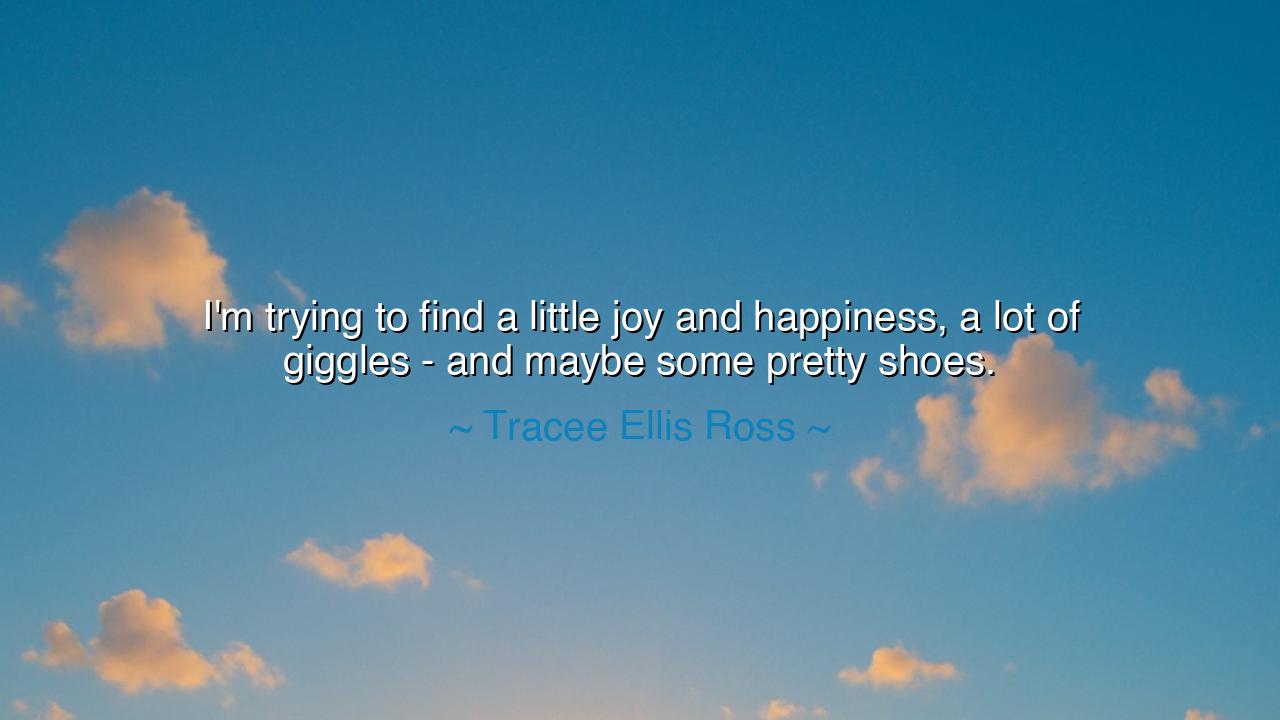
I'm trying to find a little joy and happiness, a lot of giggles -
I'm trying to find a little joy and happiness, a lot of giggles - and maybe some pretty shoes.






The words of Tracee Ellis Ross—“I’m trying to find a little joy and happiness, a lot of giggles – and maybe some pretty shoes”—may seem lighthearted, yet within them lies a deep and timeless wisdom: that the pursuit of joy, of laughter, and even of beauty, is a sacred act of resilience. These words are not merely the musings of a woman seeking pleasure, but the declaration of a spirit determined to live fully, even amid the heaviness of the world. They remind us that joy is not frivolous—it is strength disguised in laughter, a rebellion against despair, and a form of self-love that nourishes the soul.
In the age of the ancients, philosophers spoke of eudaimonia, the good and flourishing life. It was not wealth or power that marked a life well-lived, but the quiet contentment of the heart—the ability to find delight in the ordinary, and meaning in the fleeting. So too does Ross’s voice echo through time, teaching that happiness is not something one stumbles upon, but something one creates with intention, like a craftsman shaping beauty from clay. The “giggles” she seeks are symbols of lightness, reminders that even the smallest bursts of laughter can heal what sorrow has broken.
Her mention of “pretty shoes” carries its own poetry. It is not vanity, but symbolism: the desire to walk through life with grace, to adorn the journey with things that bring confidence and delight. Just as a warrior in ancient days might polish his armor before battle, or a queen wear her crown even in exile, so too does Ross remind us that the things that bring us joy—however simple or glittering—are worth cherishing. Beauty, when embraced with gratitude and not pride, becomes a celebration of being alive.
Consider the tale of Audrey Hepburn, who, after surviving the ravages of war and hunger as a young girl in the Netherlands, would later become a beacon of grace and joy to the world. She loved laughter, fashion, and the small wonders of life, yet beneath her elegance was the memory of hardship. Her devotion to children’s aid and her radiant kindness showed that joy and purpose are not opposites—they are siblings. To find joy after suffering is not denial; it is courage. Hepburn, like Ross, lived by that quiet wisdom: that light, laughter, and beauty can be acts of defiance against darkness.
Ross’s words also carry the rhythm of self-acceptance. She does not say she has found joy, but that she is trying to find it. In that striving lies honesty. The ancients would have called this the “path of becoming”—the understanding that life is not a destination of happiness, but a continual seeking. Each day we must tend our inner gardens, pulling out weeds of doubt and watering seeds of laughter. There is humility in the quest, and in it, we find grace.
From her gentle declaration, a powerful lesson emerges: that joy must be cultivated even when life feels ordinary or uncertain. It is not the grand victories that sustain us, but the small acts of choosing delight—the morning sun through a window, the laughter of friends, the satisfaction of wearing something that makes the heart smile. These are the sacred rituals of living well. The ancients taught that the soul must be balanced; Ross teaches that laughter and beauty help restore that balance.
So, dear listener, take this wisdom and live it. Seek a little joy and happiness, not as a luxury but as a necessity. Laugh deeply, even when the world feels heavy. Surround yourself with beauty—not for pride, but for remembrance that life is meant to be cherished. Wear your “pretty shoes,” whatever they may be—your art, your song, your smile—and walk boldly toward the light. For in the end, the truest wisdom is simple: to live joyfully is to live bravely, and every giggle, every glimmer of beauty, is a triumph of the human spirit.






AAdministratorAdministrator
Welcome, honored guests. Please leave a comment, we will respond soon